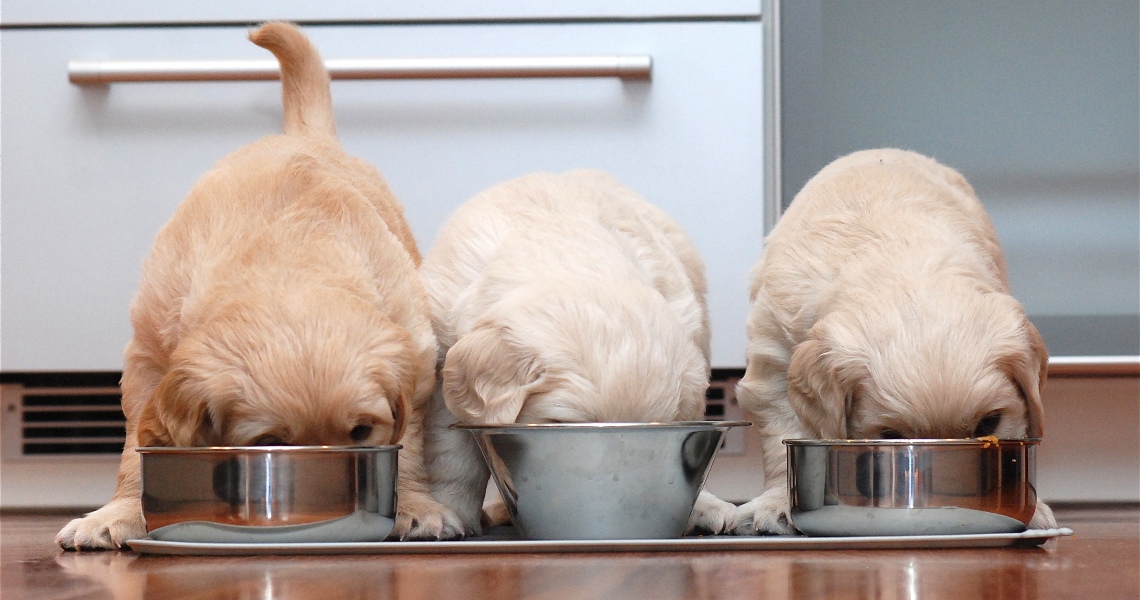Puppy food: characteristics and advantages
Discover the different types of puppy food, their main characteristics and all the advantages they offer for healthy growth.

Owning a dog is one of life's greatest joys. Loving and playing with them is important, but there’s much more involved in looking after them, including feeding them properly. Good nutrition not only helps our pet to be active and look healthy, it also influences their immune system, the optimal development of their bones, muscle, organs and brain, and their ability to learn.
As is the case with people, a puppy's nutritional needs are not the same as an adult or older dog. That’s why puppy food must be tailored to their stage of life. Dogs are considered to be puppies approximately from the age of eight months until their first year of life, although this period can be extended to 18-24 months in the case of large breeds. From that point onwards, they enter adult life and subsequently maturity (7-10 years) or the senior stage (from 9-11 years, depending on breed).
When is it advisable to give food to puppies?
During their first weeks of life, puppies feed exclusively from their mother’s milk, vital for their immune system thanks to the antibodies it provides. If this option is not possible, special puppy milk can be used, but always with the guidance of a vet.
Knowing when to start giving puppies food is fundamental. This period starts at around 3-4 weeks, when weaning begins and they start to try their first solid foods. At first, introducing wet food or natural food is advisable, softening it with water or stock which is low in salt to make it easy to chew and digest. As they get used to it, the wetness can be reduced until they tolerate dry food.
What nutrients does a puppy need?
Puppies are in full growth and therefore have more demanding energy needs than adult dogs. A proper diet must include high quality proteins, essential fatty acids, phosphorus, vitamins, minerals and, of course, water. Due to their small stomachs, however, it's best to split the daily ration of food into several meals.
Choosing good puppy food is crucial, a choice that will depend on factors such as breed, size, activity levels or food sensitivity.

Natural puppy food: healthy nutritional benefits
Natural food is characterised for being made with fresh ingredients, free from preservatives and artificial colouring.
- Advantages: it has a high nutritional quality, is easier to digest, with an attractive taste and lower risk of allergies.
- Disadvantages: it is more expensive and doesn’t last as long (as it doesn’t contain artificial preservatives).
Wet puppy food: nutritional benefits and added hydration
With a high water content, wet food is usually sold in tins or packets.
- Advantages: it helps to keep puppies hydrated, is very palatable and easy to chew.
Disadvantages: it's more expensive, it deteriorates easily once open and has a shorter use life.
Semi-wet food: pros, cons and when to choose it
With a texture in between wet and dry, semi-wet food is very attractive to puppies who are learning to chew.
- Advantages: it’s more tasty and easy to chew than dry food, and is easy to digest.
- Disadvantages: it usually contains more additives and is also more expensive.
Cereal-free food: ideal for dogs with food sensitivities
Cereal-free food is specially formulated for dogs with gluten allergies or intolerances, and is made without wheat, corn or barley.
- Advantages: it's rich in natural ingredients, ideal for dogs with food sensitivities and has a high protein content.
- Disadvantages: it’s more expensive and not necessarily beneficial for all dogs.
Hypoallergenic food: perfect for improving digestion
Finally, hypoallergenic feed is ideal for dogs with diagnosed food intolerances.
- Advantages: it reduces the risk of allergies and improves digestion.
- Disadvantages: it is more expensive than others and there is less variety available on the market.
A puppy’s diet is a key stage of their life. Choosing the best food for them, tailored to their specific needs, will be the best way of providing them with a solid foundation for a long and healthy life.
What do you think about?
Share comments, opinions and tricks with the Community








